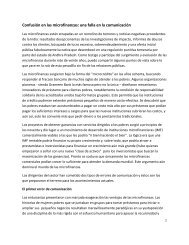Voices from the Frontlines: - Freedom from Hunger
Voices from the Frontlines: - Freedom from Hunger
Voices from the Frontlines: - Freedom from Hunger
You also want an ePaper? Increase the reach of your titles
YUMPU automatically turns print PDFs into web optimized ePapers that Google loves.
tangible tokens of appreciation for <strong>the</strong>ir loyalty, credit officers do, too. “Well, <strong>the</strong>y could train us<br />
more or maybe give us more prizes and incentives for doing our job well. It’s been a long time since <strong>the</strong>y’ve done<br />
that.”<br />
5. There is variability in how valued credit officers feel. More than one-half (63%) of <strong>the</strong> credit<br />
officers feel very valued, some (25%) feel somewhat valued and <strong>the</strong> remaining (12%) don’t really<br />
feel valued at all. Those who feel valued indicate that <strong>the</strong>y feel “listened to” at multiple levels of<br />
<strong>the</strong> organization and feel as though <strong>the</strong>ir direct supervisor recognizes <strong>the</strong>ir efforts. If feeling<br />
valued stops at <strong>the</strong>ir direct supervisor, this contributes to <strong>the</strong>m feeling less valued; for example,<br />
“Our value as credit officers is recognized by <strong>the</strong> agency boss and our co-workers, but not formally within [<strong>the</strong><br />
organization].” Some supervisors acknowledged that credit officers often receive more negative<br />
than positive feedback, even though <strong>the</strong>re are processes in place to give feedback and support<br />
on an ongoing basis, such as during monthly meetings or through monthly “performance<br />
reviews”:<br />
“We have evaluation forms that <strong>the</strong> supervisors use. Also, we let <strong>the</strong> credit officers provide feedback on<br />
training <strong>the</strong>y receive. Credit officers tend to receive more negative than positive feedback.”<br />
“Trainings, workshops, sometimes individual meetings with credit officers when it is necessary. Credit officers<br />
receive both positive and negative feedback.”<br />
How faithfully are programs, policies and procedures carried out by credit officers?<br />
One of <strong>the</strong> key questions asked in this research is about <strong>the</strong> principal-agent challenge; basically,<br />
organizations (principal) try to get <strong>the</strong>ir staff (agent) to deliver a particular service or follow<br />
particular rules. But as we’ve seen so far, credit officers, in this case <strong>the</strong> “agents,” are a<br />
heterogeneous group for <strong>the</strong> most part. As a heterogeneous group, <strong>the</strong>y are likely to deliver services<br />
primarily based on relationships in very different ways. So, how do <strong>the</strong> organizations design<br />
“systems” to ensure a fairly homogeneous delivery of <strong>the</strong>ir services?<br />
Credit officers were primarily asked questions about how <strong>the</strong>y balance client and organizational<br />
needs and under what circumstances <strong>the</strong>y might make <strong>the</strong>ir own decisions. They were asked to share<br />
decisions <strong>the</strong>y had made on <strong>the</strong>ir own, perhaps contrary to policies and procedures, and reasons<br />
behind <strong>the</strong>se decisions. Supervisors were also asked whe<strong>the</strong>r credit officers are encouraged to make<br />
some of <strong>the</strong>ir own decisions or what guidelines and support systems exist to reduce individual<br />
decision-making. In this section, we give <strong>the</strong> supervisors’ commentary first to indicate what is<br />
expected of credit officers in <strong>the</strong>se scenarios, <strong>the</strong>n we share <strong>the</strong> credit officers’ perspectives and<br />
experiences.<br />
1. Supervisors indicate that <strong>the</strong>re are policies and procedures that credit officers must<br />
follow, but <strong>the</strong>y acknowledge that credit officers have to often use <strong>the</strong>ir own<br />
judgment…and that <strong>the</strong> institutions depend on this judgment. Credit officers can use <strong>the</strong>ir<br />
own judgment as long as <strong>the</strong>ir decisions are in compliance with <strong>the</strong> policies and procedures.<br />
Where <strong>the</strong>y see most credit officers using <strong>the</strong>ir own judgment is in how to handle group conflict.<br />
Most of <strong>the</strong> organizations manage village banks and repayment re-structuring is rare because<br />
<strong>Voices</strong> <strong>from</strong> <strong>the</strong> <strong>Frontlines</strong> 19















